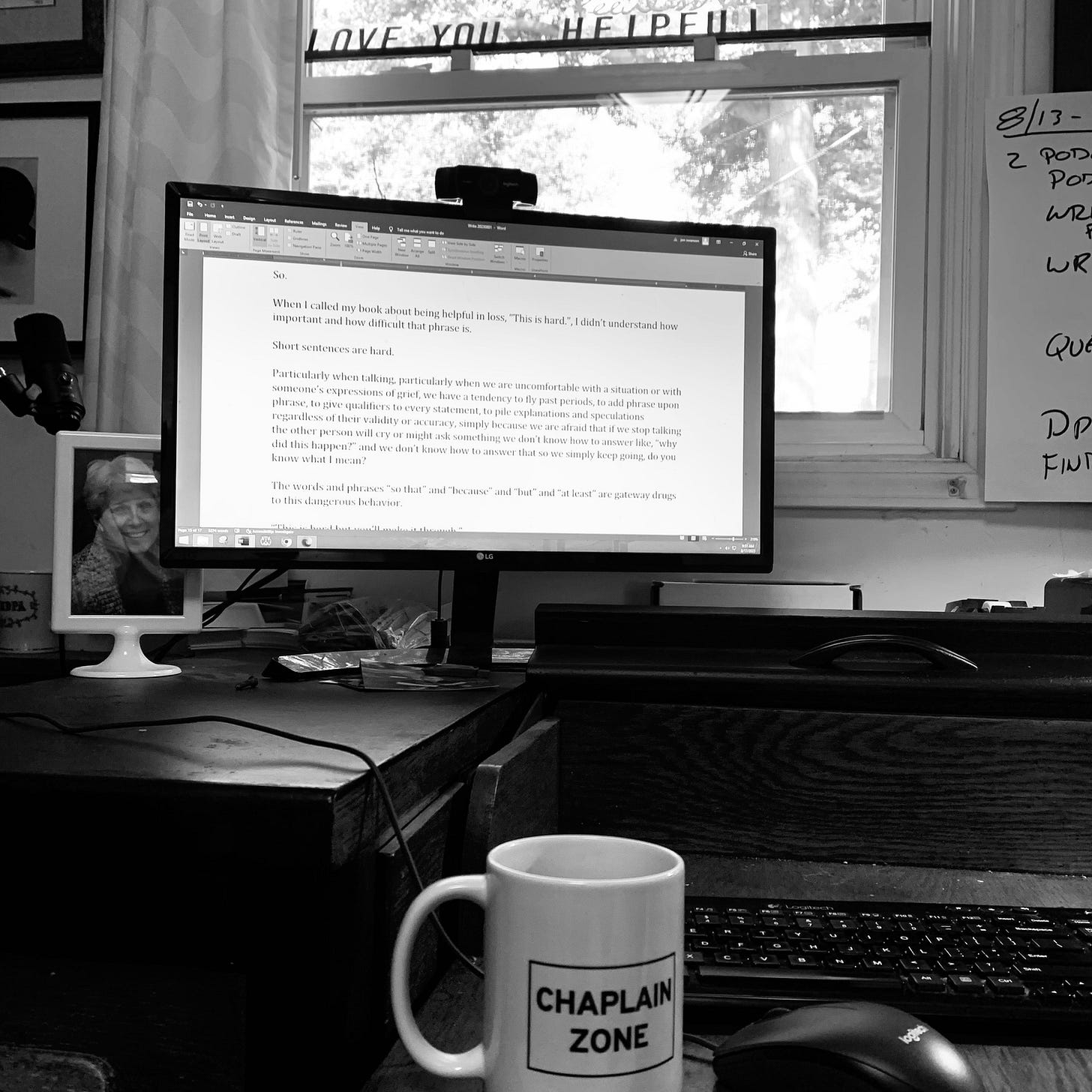Welcome back (or welcome)!
This is a newsletter with stories and tools to help you be more comfortable as you help others in hard times. Today’s story is about helpful brevity. And the tool is a list of ways to be helpful to a friend in the ER.
+++
When I called my book about being helpful in loss “This is hard”, I didn’t understand how important and how difficult the brevity of that phrase is.
Short sentences are hard.
Particularly when talking, particularly when we are uncomfortable with a situation or with someone’s expressions of grief, we have a tendency to fly past periods, to add phrase upon phrase, to give qualifiers to every statement, to pile explanations and speculations regardless of their validity or accuracy, simply because we are afraid that if we stop talking, the other person will cry or might ask something we don’t know how to answer like, “why did this happen?” and we don’t know how to answer that, so we simply keep going, do you know what I mean?
Take a breath.
The words and phrases “so that” and “because” and “but” and “at least” are gateway drugs to this dangerous run-on behavior.
“This is hard, but you’ll make it through.”
“This is hard, but at least you can still have more children.”
“This is hard, but because you are strong and, oh, you have been so strong this whole time, I can’t imagine how I’d be, but you are strong.”
I could, of course, write more examples. I don’t need to. You know what I mean.
What can we do to be more helpful? How can we avoid endless chatter?
“I don’t know” and the use of periods are two of the best tools. When someone asks why, we can say, “I don’t know.” And we can say, “This is hard.”
And we stop filling the silence with words. Instead, we can fill it with quiet.
++
+
A quick list for being helpful when supporting people in the Emergency Department.
Imagine that you get a call from your best friend, letting you know that their spouse is in the ER. You head to the hospital immediately and find them in the consult room or in the surgery waiting area. What can you do to be most helpful?
I offer these in no particular order. They all correspond to actual situations I’ve seen.
Remember how exhausting it is to be uncertain, and being in the ER is, by definition, uncertain.
Remember to knock before entering.
Don’t add to the chaos, absorb it. When we show up more frantic than the family, we aren’t helpful.
Don’t take over conversations. When we start talking about what happened to our relative or what we heard about once, we add to the confusion that the family is feeling.
Listen carefully without comment to what physicians and nurses and other staff are saying. Take notes if need be. So you can be the memory your friend can’t be right now.
Remember that most of us talk too fast when we are nervous, so take a breath.
Take a stack of quarters and a bottle of water and a couple of small blankets and whatever snack your friend’s family ISN’T allergic to. (The blankets are in case your friend rushed out of the house without anything warm to wear.)
Remember that according to law, you may not have any standing for making decisions, so don’t try to.
Consider not asking, “How are you doing?” and “Are you doing okay?” and “What would you like me to do?”
Consider asking, “Do you need to go to the restroom?” And saying, “Here’s a tissue.” And taking the baby for a walk.
Remember to wash (or foam) your hands regularly.
Remember to leave.
If you have additional suggestions for what would have, or did help you in the ER, you’ll help us by leaving a comment.
Thanks for reading. I’ll see you next week.
Jon
+++







It took me several years (!) to learn it was okay to leave. We can always come back if necessary. And we do not have to be there when the patient or church member breathes his or her last breath (although I have been there too many times to remember). What people will remember was that we were there.
These 12 suggestions are full of wisdom. I will never forget the friend who just showed up at the waiting room with hugs (very few words) and a bag filled with water and snacks. She provided everything I needed at that moment. This is a friend who just always seems to know when to show up and what to bring in hard situations. May God continue to Bless your writing. Myra